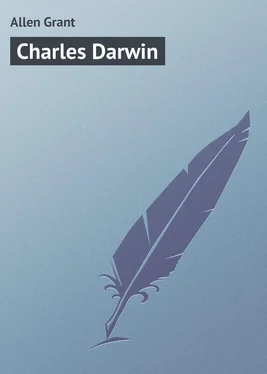Grant Allen - Charles Darwin
Здесь есть возможность читать онлайн «Grant Allen - Charles Darwin» — ознакомительный отрывок электронной книги совершенно бесплатно, а после прочтения отрывка купить полную версию. В некоторых случаях можно слушать аудио, скачать через торрент в формате fb2 и присутствует краткое содержание. Жанр: foreign_prose, на английском языке. Описание произведения, (предисловие) а так же отзывы посетителей доступны на портале библиотеки ЛибКат.
- Название:Charles Darwin
- Автор:
- Жанр:
- Год:неизвестен
- ISBN:нет данных
- Рейтинг книги:4 / 5. Голосов: 1
-
Избранное:Добавить в избранное
- Отзывы:
-
Ваша оценка:
- 80
- 1
- 2
- 3
- 4
- 5
Charles Darwin: краткое содержание, описание и аннотация
Предлагаем к чтению аннотацию, описание, краткое содержание или предисловие (зависит от того, что написал сам автор книги «Charles Darwin»). Если вы не нашли необходимую информацию о книге — напишите в комментариях, мы постараемся отыскать её.
Charles Darwin — читать онлайн ознакомительный отрывок
Ниже представлен текст книги, разбитый по страницам. Система сохранения места последней прочитанной страницы, позволяет с удобством читать онлайн бесплатно книгу «Charles Darwin», без необходимости каждый раз заново искать на чём Вы остановились. Поставьте закладку, и сможете в любой момент перейти на страницу, на которой закончили чтение.
Интервал:
Закладка:
The Darwins, indeed, were all a mighty folk, of varied powers and varied attainments. Erasmus's brother, Robert, was the author of a work on botany, which long enjoyed a respectable repute. Of his sons, one, Sir Francis Darwin, was noted as a keen observer of animals; a second, Charles, who died at twenty-one, was already the author of a very valuable medical essay; while the third, Robert, was the Shrewsbury F.R.S., the father of our great evolutionary thinker. And among Charles Darwin's own cousins, one is Mr. Hensleigh Wedgwood, the philologist; a second was the late Sir Henry Holland; and a third is Mr. Francis Galton, the author of that essentially Darwinian book, 'Hereditary Genius.'
Robert Waring Darwin took to himself a wife from another very great and eminent family. He married Susannah Wedgwood, daughter of Josiah Wedgwood, the famous potter; and from these two silent representatives of powerful stocks, Charles Robert Darwin, the father of modern evolutionary biology, was born at Shrewsbury, on February the 12th, 1809. That Wedgwood connection, again, is no mere casual or unimportant incident in the previous life-history of the Darwinian originality; it throws a separate clear light of its own upon the peculiar and admirably compounded idiosyncrasy of Charles Darwin.
A man, indeed, owes on the average quite as much to his mother's as to his father's family. It is a mere unscientific old-world prejudice which makes us for the most part count ancestry in the direct ascending male line alone, to the complete neglect of the equally important maternal pedigree. Prom the biological point of view, at least, every individual is a highly complex compound of hereditary elements, a resultant of numerous converging forces, a meeting place of two great streams of inheritance, each of which is itself similarly made up by the like confluence of innumerable distinct prior tributaries. Between these two it is almost impossible for us accurately to distribute any given individuality. How much Charles Darwin owed to the Darwins, and how much he owed in turn to the Wedgwoods, no man is yet psychologist enough or physiologist enough to say. But that he owed a great deal to either strong and vigorous strain we may even now quite safely take for granted.
The Wedgwood family were 'throwers' by handicraft, superior artisans long settled at Burslem, in the Staffordshire potteries. Josiah, the youngest of thirteen children, lamed by illness in early life, was turned by this happy accident from his primitive task as a 'thrower' to the more artistic and original work of producing ornamental coloured earthenware. Skilful and indefatigable, of indomitable energy and with great powers of forcing his way in life against all obstacles, young Wedgwood rose rapidly by his own unaided exertions to be a master potter, and a manufacturer of the famous unglazed black porcelain. Those were the darkest days of industrial art and decorative handicraft in modern England. Josiah Wedgwood, by his marked originality and force of character, succeeded in turning the current of national taste, and creating among us a new and distinctly higher type of artistic workmanship. His activity, however, was not confined to his art alone, but found itself a hundred other different outlets in the most varied directions. When his potteries needed enlargement to meet the increased demand, he founded for the hands employed upon his works the model industrial village of Etruria. When Brindley began cutting artificial waterways across the broad face of central England, it was in the great potter that he found his chief ally in promoting the construction of the Grand Trunk Canal. Wedgwood, indeed, was a builder of schools and a maker of roads; a chemist and an artist; a friend of Watt and an employer of Flaxman. In short, like Erasmus Darwin, he possessed that prime essential in the character of genius, an immense underlying stock of energy. And with it there went its best concomitant, the 'infinite capacity for taking pains.' Is it not probable that in their joint descendant, the brilliant but discursive and hazardous genius of Erasmus Darwin was balanced and regulated by soberer qualities inherited directly from the profound industry of the painstaking potter? When later on we find Charles Darwin spending hours in noting the successive movements of the tendrils in a plant, or watching for long years the habits and manners of earthworms in flower-pots, may we not reasonably conjecture that he derived no little share of his extraordinary patience, carefulness, and minuteness of handicraft from his mother's father, Josiah Wedgwood?
Such, then, were the two main component elements, paternal and maternal, from which the striking personality of Charles Darwin was no doubt for the most part ultimately built up.
CHAPTER III
EARLY DAYS
As the Chester express steams out of Shrewsbury station, you see on your left, overhanging the steep bank of Severn, a large, square, substantial-looking house, known as the Mount, the birthplace of the author of the 'Origin of Species.' There, in the comfortable home he had built for himself, Dr. Robert Darwin, the father, lived and worked for fifty years of unobtrusive usefulness. He had studied medicine at Edinburgh and Leyden, and had even travelled a little in Germany, before he settled down in the quiet old Salopian town, where for half a century his portly figure and yellow chaise were familiar objects of the country-side for miles around. Among a literary society which included Coleridge's friends, the Tayleurs, and where Hazlitt listened with delight to the great poet's 'music of the spheres,' in High Street Unitarian Chapel, the Mount kept up with becoming dignity the family traditions of the Darwins and the Wedgwoods as a local centre of sweetness and light.
On February the 12th, 1809, Charles Darwin first saw the light of day in this his father's house at Shrewsbury. Time and place were both propitious. Born in a cultivated scientific family, surrounded from his birth by elevating influences, and secured beforehand from the cramping necessity of earning his own livelihood by his own exertions, the boy was destined to grow up to full maturity in the twenty-one years of slow development that immediately preceded the passing of the first Reform Act. The thunder of the great European upheaval had grown silent at Waterloo when he was barely six years old, and his boyhood was passed amid country sights and sounds during that long period of reconstruction and assimilation which followed the fierce volcanic outburst of the French Revolution. Happy in the opportunity of his birth, he came upon the world eight years after the first publication of Lamarck's remarkable speculations, and for the first twenty-two years of his life he was actually the far younger contemporary of the great French evolutionary philosopher. Eleven years before his arrival upon the scene Malthus had set forth his 'Principle of Population.' Charles Darwin thus entered upon a stage well prepared for him, and he entered it with an idiosyncrasy exactly adapted for making the best of the situation. The soil had been thoroughly turned and dressed beforehand: Charles Darwin's seed had only to fall upon it in order to spring up and bear fruit a hundredfold, in every field of science or speculation.
For it was not biology alone that he was foredoomed to revolutionise, but the whole range of human thought, and perhaps even ultimately of human action.
Is it mere national prejudice which makes one add with congratulatory pleasure that Darwin was born in England, rather than in France, in Germany, or in America? Perhaps so; perhaps not. For the English intellect does indeed seem more capable than most of uniting high speculative ability with high practical skill and experience: and of that union of rare qualities Darwin himself was a most conspicuous example. It is probable that England has produced more of the great organising and systematising intellects than any other modern country.
Читать дальшеИнтервал:
Закладка:
Похожие книги на «Charles Darwin»
Представляем Вашему вниманию похожие книги на «Charles Darwin» списком для выбора. Мы отобрали схожую по названию и смыслу литературу в надежде предоставить читателям больше вариантов отыскать новые, интересные, ещё непрочитанные произведения.
Обсуждение, отзывы о книге «Charles Darwin» и просто собственные мнения читателей. Оставьте ваши комментарии, напишите, что Вы думаете о произведении, его смысле или главных героях. Укажите что конкретно понравилось, а что нет, и почему Вы так считаете.












